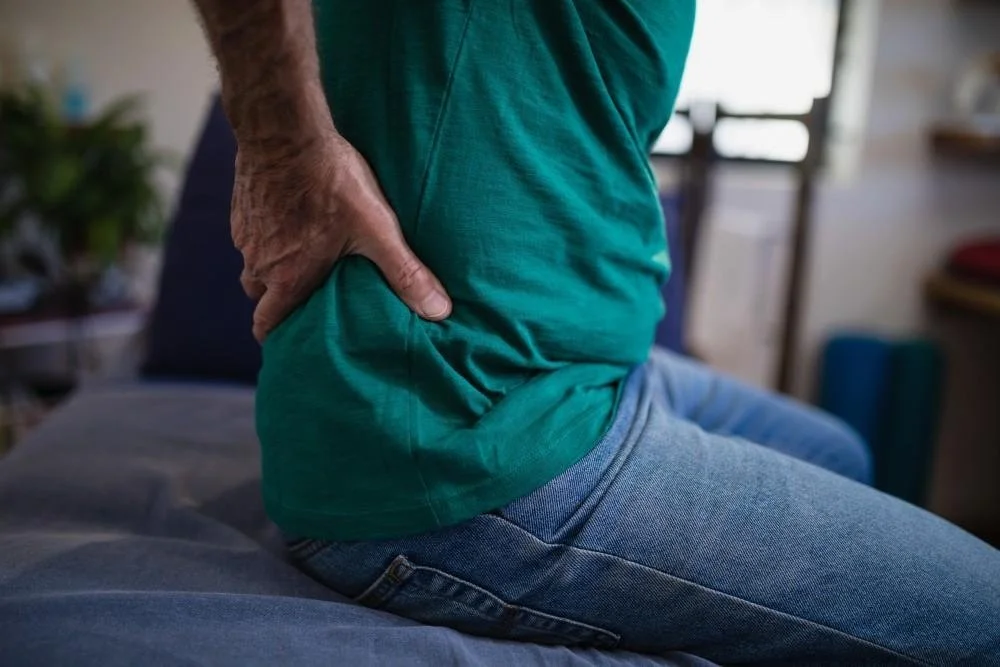6 Surprising Reasons Why Your Back May Be Hurting
A lot of serious back injuries stem from workplace accidents or car crashes, but it's not uncommon for people to suffer debilitating back pain from seemingly harmless day-to-day activities. In some cases, people can tweak a muscle in their lower back while picking up a heavy object. Oftentimes, back injuries happen as a result of repeated stress on muscles and joints, poor posture, and improper form when lifting weights.
The lower back has fewer vertebrae—just five in total—than the mid-back and neck, yet it often bears the brunt of the load when lifting heavy objects. A sedentary lifestyle, obesity, and smoking are among the most well-known causes of low back pain, but there are several surprising things that can worsen back pain or compound with other risk factors to cause problems over time. Here’s a look at some of them.
Constant Phone Use
Whether sitting or standing, it's important to keep the spine in a neutral position with the shoulders square and relaxed and the head level. This alignment promotes good posture and helps protect against muscle imbalances and joint degeneration. Those who work in an office setting, for example, might notice neck or back pain from craning their neck down to look at their computer. Stand-sit desks and adjustable chairs can help prevent this.
Smartphones are also major contributors to neck and back pain. The average American spends around five hours per day on their smartphone, often with their head tilted forward or their spine in a flexed position, causing undue strain and stress on the vertebrae and surrounding muscles. According to a study published in the Journal of Clinical Medicine in February 2025, "text neck syndrome" is a common disorder that may affect up to 93% of smartphone users.
Stress and Anxiety
Stress and anxiety can also trigger physical pain, potentially contributing to low back pain through a variety of ways. When you're feeling stressed or tense, physical symptoms may feel worse due to the body being in a heightened state of sensitivity. You might also have trouble sleeping, which can drain your energy, leave you feeling irritable and tense, and make you more prone to slouching.
There is also evidence that chronic stress contributes to cortisol dysfunction and inflammation issues, which can expedite tissue degeneration, a key factor for chronic pain.
Dehydration
Water is a vital component in the proper functioning of the human body. Of course, it is critical for hydration, but also regulates internal body temperature, transports essential proteins and carbohydrates in the bloodstream, helps flush out waste, and serves as a shock absorber for the brain and spinal cord. Spinal discs, which function as cushions between each vertebrae, can shrink or become less effective when dehydrated. This increases the risk of bulging or herniated discs.
When the body is dehydrated, muscles, particularly those near the neck and back, are also more likely to cramp or tighten. The average person should consume at least 3 liters of water each day to be sufficiently hydrated. Try drinking a glass in the morning and sip regularly throughout the day rather than waiting until you feel thirsty.
Backpack Over One Shoulder
Most people don’t really think about their back when they slip a heavy bag over one shoulder or use one strap when wearing their backpack. However, the damage from carrying uneven loads can really compound over time.
Carrying a heavy backpack or a purse over one shoulder may not cause immediate pain, but over time can contribute to a muscular imbalance. The rhomboids, trapezius, and lumbar muscles on that side of the body are forced to work harder and may become stronger than those on the other side. This can increase the risk of scoliosis-like spinal curvature and herniated discs.
Improper Footwear
The body's kinetic chain includes the spinal column, pelvis, hips, and upper and lower extremities. Dysfunction or misalignment in any of these areas can have a negative impact on other parts of the chain. An improper gait, like supination (foot rolling outward) or overpronation (foot rolling inward), can eventually lead to a misaligned spine. This is why it's vital to wear shoes with proper arch support.
Your shoes should also have sufficient cushioning to help reduce the amount of force your feet absorb with each step, particularly when running. A gait analysis can help you identify your walking and running patterns, which can make it easier to find the right pair of shoes to protect your feet and spine.
Poor Sleep Position
Sleeping in any position with an unnatural curvature of the spine, over time, can strain your back muscles and lead to chronic back pain. Sleeping on your stomach and constantly twisting and turning in your sleep also puts added stress on the spine.
To avoid frequent moving while sleeping, place a pillow between your legs if you're a side sleeper or under your legs when sleeping on your back.
